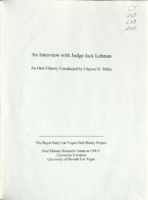Search the Special Collections and Archives Portal
Search Results

José Armando Elique interview, January 14, 2019: transcript
Date
Archival Collection
Description
José Armando Elique was born on February 14, 1944 in New York City. Born to Puerto Rican parents that immigrated to the United States in the 20s, Elique spent his childhood in both New York and Puerto Rico. Raised in the South Bronx, Elique’s family were part of the first pioneros from Puerto Ricans to settle in New York City in the twentieth century. Elique served as a radar man in the United States Navy during the Vietnam War on the USS Purdey. After his service, Elique applied to the Port Authority Police Department where his first big assignment included going undercover and investigating gang activity. Over the course of the next 22 years, he rose through the rankings becoming the assistant chief in charge of overseeing six facilities in the region. Elique is the first and only Latino to reach such rank with the Port Authority. Elique moved to Nevada in 2000 and became the chief of UNLV Police Services. Prior to coming to UNLV, he served as the University Director of Public Safety for the City University of New York (CUNY). Elique is also a member of the National Latino Police Officers Association, an organization that helps train Latino officers on contemporary issues and promote the advancement of Latinos in the police force. As police chief, Elique has fought for the hiring of new police officers to better serve UNLV’s campus and student body. As Chief of Police, Elique oversaw the response of his team to secure the campus and to provide for the needs of those seeking refuge at Thomas and Mack Center on the night of October 1, 2017. Chief Elique is also part of the Remembering 1 October oral history project where he reflected on that night, the role of campus police, coordination with Metro Police, purpose of the Fusion Center, command post, Emergency Operation Center for business continuity, and preparedness of urgent situation and active shooters. He is a graduate of Adelphi University and of Northwestern University’s Traffic Institute of Police Administration and the Police Executive Research Forum’s Senior Management Institute for Police.
Text

Transcript of interview with Arby Hambric by Claytee D. White, September 23, 2015
Date
Archival Collection
Description
Arby L. Hambric's book entitled, "To Thee I See: From picking in the fields of Texas to cooking for dignitaries on U.S. Navy ships, a journey I wouldn't change," describes his profound journey from working in the cotton fields as a child to being drafted into the U.S. Navy, before completing high school. During this interview, he recalls the significant achievements of the "Red Tails" and the Tuskegee Airmen. Beginning his 20 year Navy career before military integration, Arby describes the racial tensions that plagued the U.S. Navy in the 1940s, and discusses how he was able to successfully navigate that racist environment for two decades and three war eras. Arby enrolled in San Diego State College after leaving the U.S. Navy. He also worked as maintenance personnel for Sears and Roebuck and started a catering business with his wife. He became a member of the Southern Nevada Enterprise Community, SNEC Board upon moving to Las Vegas, Nevada, after his wife died. With a family legacy he can be proud of, Arby highlights the achievements of his great grandson Taquan Mizzell, a Virginia Cavaliers running back at the University of Virginia. As a Navy veteran, Arby often volunteered his time and resources to help others in need. He recalls driving the sick and elderly back and forth from the Westside community to Valley Hospital or University Medical Center, UMC. He also discusses government enforced road closures and a wall that was built to block Blacks from entering the new downtown. This interview sheds new light on military integration and offers key strategies for overcoming environmental racism. Arby mentions a documentary about the closing of the wall and offers his predictions on the future of the Westside.
Text

Transcript of interview with Mary Shaw by Barbara Tabach, September 2, 2011
Date
Archival Collection
Description
For the first 19 years of her life, Mary Martell Shaw called Central America home. Then thanks to misrouted luggage, she met the love of her life Rollin H. Shaw, a civil engineer, at a time in when his atomic energy career was taking off. In October 1943, they married in Costa Rica and for the next two decades traversed the country: Hawaii to California to Panama—wherever a project required Ronnie's engineering skills. Mary supported her husband every step of the way, with every new location. As a traditional homemaker of the era, she became adept at raising their four kids while packing boxes, enrolling them in school and setting up a warm home wherever they landed. The move to Las Vegas in September 1964, however, left her a bit challenged: there was a shortage of adequate housing, a concern for where to send her two daughters and two sons to school, and the feeling that they wouldn't be here long. Years later, Mary and Ronnie would retire to the city where their roots ran deepest, Las Vegas. With great wit, Mary recalls the long absences demanded by Ronnie's work with the Atomic Energy Commission. She also tells stories of the great fun they and their fellow Nevada Test Site employees had at parties, of her learning to paint with watercolors, and the pride she has of all her children's successes based on their education in Las Vegas.
Text

Transcript of interview with Betsy Fretwell by Claytee White and Stefani Evans, August 30, 2016
Date
Archival Collection
Description
Shortly before the University of Georgia granted Betsy Fretwell Master's degree in public administration in 1991, she applied for a one-year internship with Clark County, Nevada. The County hired her, but Fretwell did not complete her internship. Instead, the County promoted her, hired her full-time, and soon had her lobbying for the County's interests in Carson City. Her insistence on learning all sides of a question and communicating that knowledge to the decision makers was one of the skills that made her so valuable to Clark County administrators. In this interview, Fretwell discusses her South Carolina childhood, her affinity for the University of Georgia Bulldogs, and the path she took to occupy the office of city manager for the City of Las Vegas. She talks about her years at Clark County and a term at the City of Henderson, but she mostly focuses on her sixteen years at the City of Las Vegas, first as assistant city manager under Virginia Valentine and later as city manage
Text

Richard C. MacDonald interview, September 20, 2016: transcript
Date
Archival Collection
Description
Henderson developer and Philadelphia native Richard MacDonald is a natural storyteller, and he has stories to tell. The man behind MacDonald Highlands and the Dragon Ridge Country Club first moved to Las Vegas as a young teen with his parents in 1959. After graduating Las Vegas High School in 1963, his parents moved to Hawaii and he enrolled at Nevada Southern University (now UNLV) and supported himself in Las Vegas by selling unfinished houses. His parents convinced him to move to Hawaii, where he attended the University of Hawaii worked with his father selling blocks of pre-developed cemetery lots to Asian buyers. In this interview, MacDonald describes his experience as a white man facing racial discrimination, of Las Vegas as Hawaii's Ninth Island, of earning his real estate broker's license, and of his father's plan to develop and sell Las Vegas property to Hawaiians. Returning to Las Vegas, MacDonald worked with Frank Sala and Chuck Ruthe to obtain his first two sections of Henderson land, which became Sun City MacDonald Ranch and the western part of MacDonald Highlands. He talks of developing Sunridge at MacDonald Ranch on Eastern Avenue and The Canyons at MacDonald Ranch. He also speaks to local prejudice against Hawaiians and to the way the City of Henderson favored Hank Greenspun and American Nevada Corporation. He recalls his twenty-year experience as a developer with the City of Henderson, its planning commission, city manager, city attorney, and city council. He reveals associations with Del Webb and the Del Webb CEO, Anthem, the Bureau of Land Management (BLM), the Sultan of Brunei, and polo fields as well as Red Alerts, the Foothills project, and MacDonald Highlands. Along the way he talks of golf course architects and planners and the MacDonald Highlands golf course, his family, the Great Recession, and his current status with the City of Henderson and the Archaeological Institute of America.
Text

Maggie Arias-Petrel interview, May 3, 2019: transcript
Date
Archival Collection
Description
Maggie Arias-Petrel is a successful businessperson and philanthropist. Born in Quito, Ecuador in 1966, Maggie grew up during the Space Age, meeting astronauts through her father’s work as a NASA engineer. Her mother worked as a teacher in an all-girls school. When she was a teenager, Maggie visited her aunt in California and decided to stay in the U.S. She eventually returned to Ecuador and helped her mother run her toy store business, helping her manage multiple locations. Her entrepreneurship flourished as she helped the family business grow into a successful enterprise. Despite the success in her home country, Maggie always dreamed of coming back and living in the U.S. When her family returned, they settled in Las Vegas in 1991. Through her entrepreneurship, Maggie helped many doctors set up their practices, and began her own consulting business, Global Professional Consulting. Today, her expertise includes over 20 years of medical practice management, marketing and advertising for medical and legal, business development and consulting experience. Maggie is also the Chairwoman of the Executive Board of Directors of the Latin Chamber of Commerce of Nevada. She is responsible for changing the direction of the Chamber and helping it become what it is today. She is also the director of the Señoras of Excellence, a philanthropic organization that focuses on raising funds to help Latino students attend college. They have awarded thousands of dollars in scholarship funds to students across the Las Vegas Valley. Because of her work in the medical field, Maggie understands the importance of affordable health care and accessibility. During the Obama Administration, she was part of Senator Harry Reid’s promotion team for the Affordable Health Care Act. She also worked with Governor Jim Gibbons doing international research work in Mexico, and was invited to the White House for the Cinco de Mayo celebration through the U.S. Hispanic Chamber and the Latino Coalition. Maggie is also responsible for the partnership between the Universidad Autónoma de Guadalajara, one of the most prestigious and accomplished institutions of higher education in Mexico, St. Rose Dominican Hospitals, and the Nevada System of Higher Education to develop nursing programs with direct collaboration from UAG to increase the number of bilingual-bicultural medical professionals in Nevada. She is the director for the Workforce Connections of Nevada Board and the Dignity HealthCare - St. Rose Dominican Hospital Board of Directors. Maggie has also received numerous accolades and awards such as the Community Service Award from the Latin Chamber of Commerce, Señoras of Excellence Award given to woman who excel in their professions, the Excellence in Advocacy Award by The Colors of Lupus Foundation, and the “Woman in Business” Award by the National Coalition of 100 Black Women. In 2011, she was named one of the ten most influential Hispanics in the city by the Las Vegas Business Press. She is also one of the community leaders featured in the Las Vegas Latino Leaders Inaugural Edition Book. Maggie attended Los Angeles Mission College and Central University of Ecuador. She lives in Green Valley with her two sons.
Text

Justin Favela interview, May 16, 2019: transcript
Date
Archival Collection
Description
Interviewed by Monserrath Hernández. A native Las Vegan, Justin Favela reminisces about growing up on the east side of the Las Vegas Valley. Favela provides insights about what he refers to as the caste system he is part of, how skin color makes a difference in social hierarchies, and his personal evaluations of the litany of terms such as Latinx, Latino/a, Hispanic etc. He discusses values impressed upon him by his family, especially his grandmothers; one is Guatemalan and the other Mexican. Favela was born in 1986 and discusses his universe where pop culture, gender, ethnicity, history, and Latinidad mix. He talks about his personal artistic expressions and the two podcast series he has created and hosts.
Text

Jocelyn Cortez interview, March 18, 2019: transcript
Date
Archival Collection
Description
Interviewed by Nathalie Martinez. Jocelyn Cortez is a Salvadoran-American immigration lawyer. She grew up on the Eastside of Las Vegas and grew up going to school in the Clark County School District and at UNLV before going to Law School at the University of Arizona. She is an engaged community member as an immigration lawyer working alongside the Culinary Union and the Latino Bar Association.
Text

Irene Cepeda interview, April 24, 2019: transcript
Date
Description
Interviewed by Monserrath Hernández, Nathalie Martinez and Rodrigo Vázquez. Irene Cepeda is a woman dedicated to serving the Latinx as well as all minority groups in education in Southern Nevada. As a Las Vegas native, she grew up alongside the Latinx community here and is a proud Latina from Nicaraguan roots. She is dedicated to uplifting the Latinx community through her work with the Latino Youth Leadership Conference and college access specialist at Nevada State College. Now, as representative of District D on the Clark County School District Board of Trustees, she seeks to tackle the issues the district faces from acts of White supremacy to a lack of funding for English Language Learner families.
Text

Transcript of interview with Jack Lehman by by Claytee White, October 17, 2007
Date
Archival Collection
Description
Judge Jack Lehman is living the life we should all strive for - a wonderful family, a work ethic that has allowed him to serve others while enjoying a magnificent life and above all a great love affair with his beautiful artistic wife, Lou Lou. From Chemnitz, Germany, at the beginning of the Nazi reign to a prominent citizen of Las Vegas, Lehman lives an extraordinary Las Vegas life. Born in Germany in the late 1920s, Jack and his sister were sent to the United States in 1935 and after a series of living situations including a orphanage in New York, they were adopted by the Lehman family in Lake Arrowhead, California. As a young boy, he wanted to become a lawyer. After a degree from Berkeley, two tours of military duty, a stint in radio broadcasting, and serving as the Director of the Nevada Department of Economic Development, he entered law school at USC. Lehman's career in the legal field began at the largest law firm in the city - Lionel Sawyer and Collins - and then into private practice and on to the bench as a District Court judge appointed by Governor Richard Bryan. In February 2008, he was honored by judges and friends statewide as the founder of Nevada's Adult Criminal Drug Court Program commonly known as "drug court." Washoe County District Judge Peter Breen said it best, "The state is a much better place because of Jack. All those people came back from the abyss of addiction because of Jack."
Text
